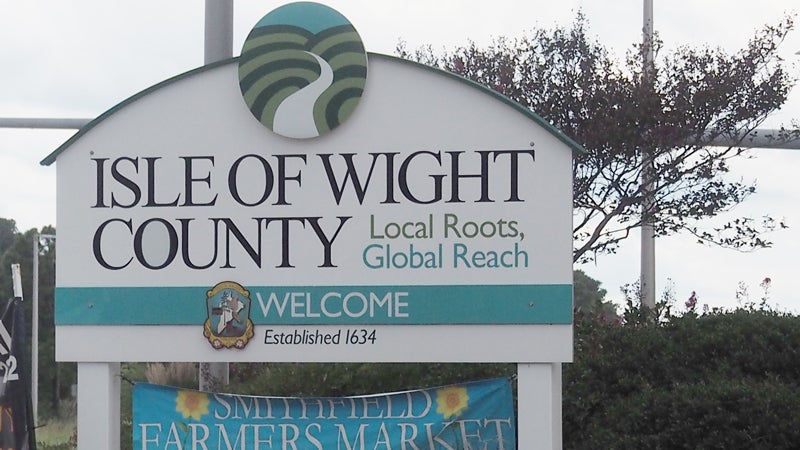IW adopts 2-cent tax increase, $107 million budget
Published 3:59 pm Friday, May 17, 2024

- FIle photo
Isle of Wight County supervisors voted unanimously just after midnight on May 17 to adopt a $107.6 million budget for the 2024-25 fiscal year.
The budget includes a 2-cent increase of the county’s real estate tax rate, down from the 5-cent increase County Administrator Randy Keaton had initially proposed, and increases the county’s meals tax rate from 4% to 6%.
The increased real estate rate is still 14% lower than the rate of 85 cents per $100 in assessed value that had been in place in 2022. The supervisors had lowered the rate to 71 cents in 2023 to partially offset last year’s real estate reassessment, which saw single-family home valuations rise 34% on average.
The new meals tax rate is on par with the towns of Smithfield and Windsor, which charge 6.25% and 6% respectively.
County water customers will also see a 5% increase in their bills. The new water rate is $12.96 per 1,000 gallons, up from $12.35. Keaton says the increase is intended to absorb a 4.7% increase in the fee the regional Western Tidewater Water Authority charges Isle of Wight.
Rather than categorically funding Isle of Wight County Schools’ operations, transportation, facilities and other line items, the supervisors voted to this year “lump sum” fund the school system $32.9 million in operating costs, which the School Board will be tasked with allocating as needed. The total amounts to a $2.7 million, or 8%, increase over the $30.4 million supervisors approved last May for the current school year.
The budget includes an additional $14 million in one-time capital projects, $9.5 million of which are for the school system.
School Board Chairman Jason Maresh, in a May 8 email, had contended to Board of Supervisors Chairman Joel Acree and Vice Chairman Don Rosie that the $2.7 million increase wouldn’t cover an increase in the tuition IWCS pays to the Governor’s Schools for the Arts and Governor’s Schools for Science and Technology, potentially resulting in fewer students from Smithfield and Windsor High Schools being able to attend, and would cover the state-mandated 3% raises for school employees but not the annual increases teachers receive under the division’s 35-step pay scale.
Supervisor Renee Rountree, however, described the $2.7 million increase as “incredibly generous.”
“We’re offering them what we can afford,” Rountree said, contending that neighboring Suffolk’s $75.3 million allocation to its school system for 2024-25 amounted to only a 5% increase over the $71.3 million allotted for the prior year.
“I don’t want to be blamed and it said that … it’s our fault as a Board of Supervisors that the school has to decrease the number of kids they’re sending to the governor’s school; I don’t want to be blamed that they’re going to have to cut all field trips; I don’t want to be blamed that they can’t do required maintenance on the buildings,” Rountree said.
Rountree then urged the School Board to give only a 1.5% raise, which is allowed under state law but would result in IWCS receiving a prorated share of the $142.7 million in state funds earmarked for the raises. The schools could then use the savings from a lower local match “to fund these other things that you may see as priorities,” Rountree said.
“They’re getting a $12 million infusion of taxpayer dollars,” said Supervisor William McCarty, referring to the combined $2.7 million increase in operating funds and $9.5 million in one-time capital expenses.
Board of Supervisors Chairman Joel Acree further noted that IWCS was able to find money in its 2023-24 budget for unarmed school security officers despite the supervisors declining to allocate additional funds for their hiring.
The seven-hour meeting, which began at 5 p.m. the day before, included 13 agenda items in addition to the budget, including public hearings on a new housing development and multi-warehouse complex that drew a standing-room-only crowd to the General District courtroom where the board meets. Several people who’d signed up to speak on the budget during the meeting’s public comment period were turned away per the board’s bylaws, which prohibit further comments ahead of a pending vote if the matter has already been the subject of an advertised public hearing. The board held separate hearings April 18 and May 9 on its proposed budget and tax rates.
“While it was sometimes unpleasant and/or uncomfortable for some, I made it a personal goal to ensure the community, and especially the BOS (Board of Supervisors), was provided with clear expectations of potential consequences of being inadequately funded,” Maresh said in a May 17 email to the Times. “The SB (School Board) acknowledges that inflation IS negatively impacting the community, to include the schools. EVERYTHING costs more today than it did before, especially the cost of maintaining IOW’s high quality schools. All of these unfortunate realities become more difficult when the schools’ mounting list of capital and maintenance needs have been deferred for years. We are grateful for the funding that has been approved and the SB will work to ensure these funds are utilized responsibly by focusing on our Division’s top priorities.”
Editor’s note: This story was updated to correct Isle of Wight County’s 2022 real estate tax rate.



